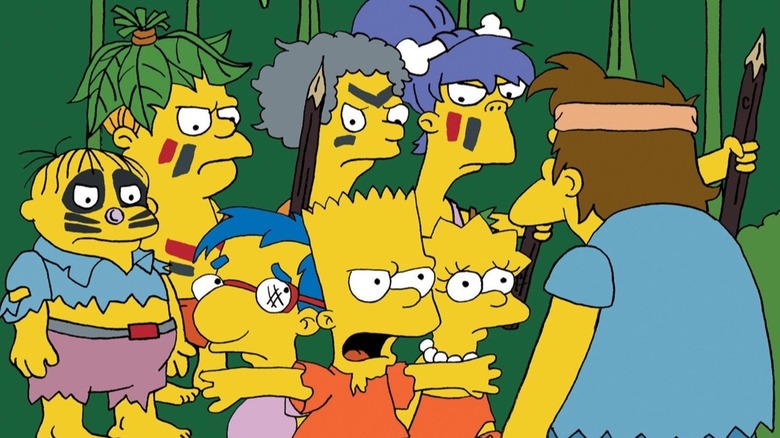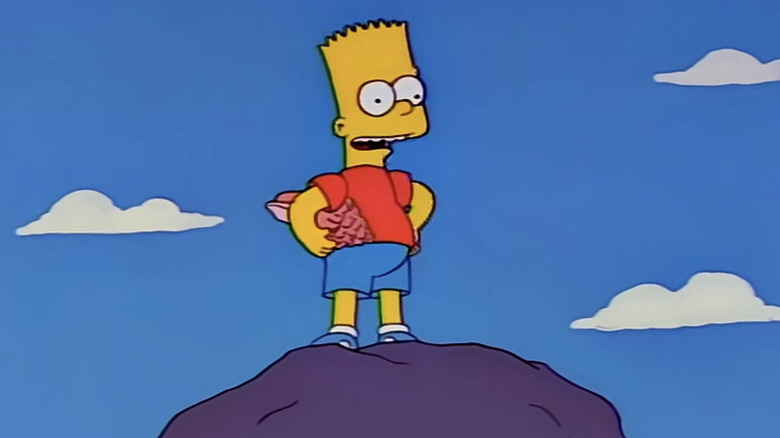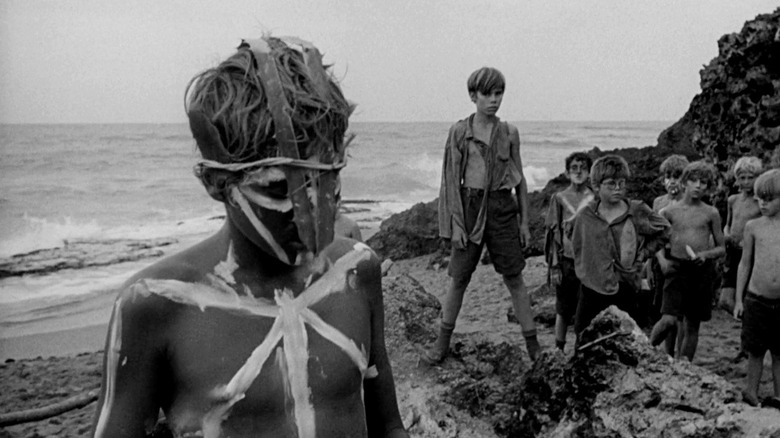A Classic Simpsons Episode Turned Lord Of The Flies Into A Comedy
We may receive a commission on purchases made from links.
"The Simpsons" thrives on parody, from "Planet of the Apes" musicals to all the trips that "Treehouse of Horror" has taken into the twilight zone. I saw "The Simpsons" episode "Rosebud" before I had ever seen "Citizen Kane" (no cane included).
"Simpsons" season 9 episode "Das Bus" homages the 1981 submarine epic "Das Boot" (German for "The Boat"). However, the actual story of the episode parodies something else: William Golding's 1954 novel "Lord of the Flies," which follows British schoolboys stranded on a desert island who then become savage and tribal murderers. In "Das Bus," Bart, Lisa, and their Springfield Elementary classmates are traveling to a statewide Model U.N. club event. A bus crash sends them into the ocean, where they drift to an uncharted island. While they miss the model U.N., they still have to use the skills of the club to form a new society.
Being the one American kid who didn't read "Lord of the Flies" in middle school (I've since corrected this oversight), I first saw the story told by "Das Bus." The parody goes well beyond the premise of "kids stuck on an island." Though definitely much funnier, the episode has the same dramatic arc as "Lord of the Flies." The kids expect they're in for an adventure (Bart: "It'll be just like 'The Swiss Family Robinson,' only with more cursing") and get hit in the face with brutal reality.
The characters become parallels to the "Lord of the Flies" cast too: The Simpson kids are both Ralph (the first leader who tries to hang onto law) and Nelson is Jack Merridew (the one who takes over and whips up the violence). Milhouse, as the chubby one with glasses, is Piggy, even if he's nowhere near as smart or mature.
Nelson even uses Milhouse's glasses to start a fire, just like the "Lord of the Flies" kids used Piggy's. When the kids first wash up on the island, Bart catches their attention by blowing into a conch shell, the way Ralph does in the book. In "Lord of the Flies," the conch shell is the symbol of the boys' democracy; to speak at an assembly, one must ask for and hold the shell. When Jack takes over, that rule breaks down.
The parallels between Das Bus and Lord of the Flies, explained
Now, unlike the "Lord of the Flies" kids, the Springfield kids struggle to forage and hunt for food. The crux of the story, and their breakdown, is a cooler full of snacks from the bus. One morning, they wake up and find it empty, and see Milhouse surrounded by snack wrappers. Milhouse is put on trial; even when Bart finds him not guilty for lack of evidence, Nelson leads the others to kill him and his defenders, Bart and Lisa. Then the kids find the real culprit and the solution to their problem: A boar. In "Lord of the Flies," Jack and his hunters hunt wild pigs. They leave one pig's decapitated head on a spike, which comes to symbolize the titular Lord of the Flies that may or may not speak to young Simon.
Unlike "Lord of the Flies," "Das Bus" ends with the kids reestablishing order before they're rescued offscreen ("by, let's say, Moe").
"The Simpsons" season 9 is usually considered the cutoff of the show's Golden Age; opinions vary on which side of that cutoff the season sits. "Das Bus" does show symptoms of the show running out of steam. It's both an outlandish premise, one utterly out of the ordinary for the show, and one that relies on another story. The B-plot — where Homer starts his own internet company — is completely disconnected from the A-plot. (Apparently, neither Homer nor Marge noticed their kids missing at any point.)
However, the episode rises above those weaknesses because it has such a unique premise. The episode's humor is also rapidfire and gut (should I say "crap factory"?) busting, like the very best of "The Simpsons." "Das Bus" was one of the last episodes written by David X. Cohen before he left for "Futurama." The episode also signals the passing of the Golden Age of "The Simpsons" in that way.
With some help from the American public education system, "Lord of the Flies" is one of the most famous and widely-read novels in the English language. Whenever a listicle of the 100 greatest novels is published, you can always find "Lord of the Flies" somewhere on it. But for such a famous story, there hasn't been a definitive adaptation of it yet — not even "Das Bus."
Is The Simpsons' Das Bus the best Lord of the Flies adaptation?
The 1963 "Lord of the Flies" film — written and directed by Peter Brook, cast with nonprofessional child actors — is faithful enough to the book. But it's also rather bloodless and doesn't capture the horror. In the book, Simon talks to the pig's head, and it answers back like it's the Devil himself. In the movie, Simon (Tom Gaman) only stares at the rotten head, as if the filmmakers just didn't know how to craft surreal horror. Shooting in black and white also winds up undermining the book's tropical setting, dulling the early sense of adventure and the eventual darkness.
The 1990 "Lord of the Flies" film directed by Harry Hook was panned on its own terms and as an adaptation of Golding's work. Roger Ebert, reviewing the picture, questioned if "Lord of the Flies" had outlived its cultural relevance.
"The story is less poignant nowadays than it once was, if only because events take place every day on our mean streets that are more horrifying than anything the little monsters do to one another on Golding's island."
Recent history has disputed Ebert's argument: "Lord of the Flies" is still taught in schools, and director Luca Guadagnino ("Call Me By Your Name," "Challengers") has been attempting to get a new "Lord of the Flies" film off the ground.
Around 2017, there was also an idea floating around Hollywood for an all-girls remake of "Lord of the Flies." That specific project never got off the ground, but the core idea has via the Showtime series "Yellowjackets." Created by Ashley Lyle and Bart Nickerson, "Yellowjackets" follows a New Jersey girls' soccer team that, in 1996, is stranded in the Canadian wilderness after a plane crash. Despite the surface differences, "Yellowjackets" pulls a lot from "Lord of the Flies" (insect-related title and all). Season 3 of the show has cemented the characters of Shauna (Sophie Nélisse) and Natalie (Sophie Thatcher) as the story's Jack and Ralph, respectively.
In putting teenage girls into survival horror, "Yellowjackets" rebuts a common joke about "Lord of the Flies" — that the boys only go savage because they're boys. As Lyle and Nickerson wrote in their original "Yellowjackets" pitch:
"In 1954, William Golding wrote a novel about a group of British schoolboys – believing, one assumes, that they represented the pinnacle of indoctrination by polite society, the repression of the true self in favor of an agreed upon set of behavioral rules. If you stop and think about it, though, what better example of social conditioning exists – then as now – than teenaged girls? Trained from childhood to take up less space, to be quieter, more polite, more agreeable, more motherf***ing ladylike than boys, women aren't inherently nicer, kinder, gentler, or weaker. They're just taught to act that way when other people are looking."
Still, "Yellowjackets" isn't really an adaptation of "Lord of the Flies." It's more of a response to Golding and the way he was responding to lighter adventure books like "The Coral Island." We'll see if the Guadagnino "Lord of the Flies" ever comes, but until then, there's always Golding's original novel (and "Das Bus").


